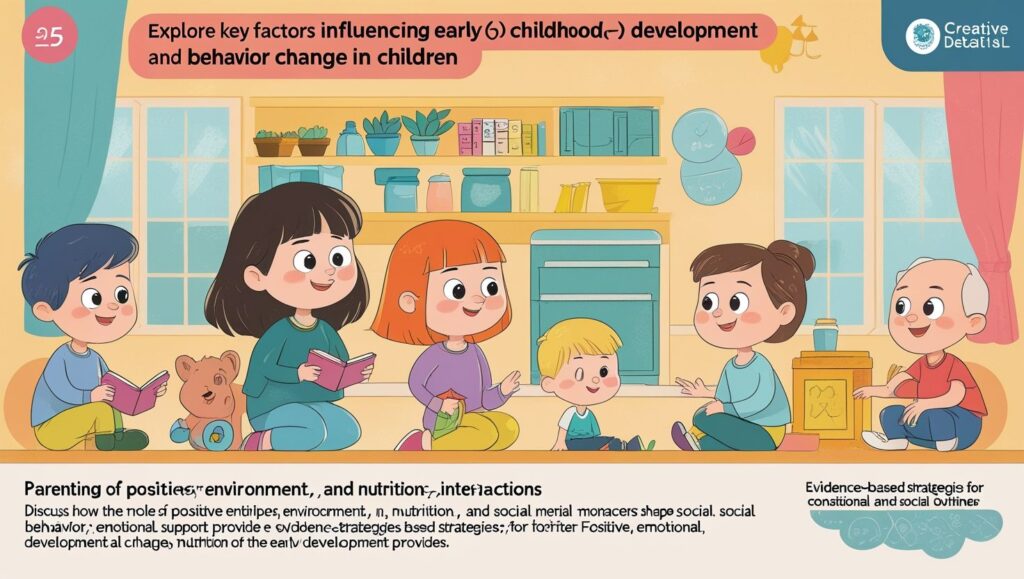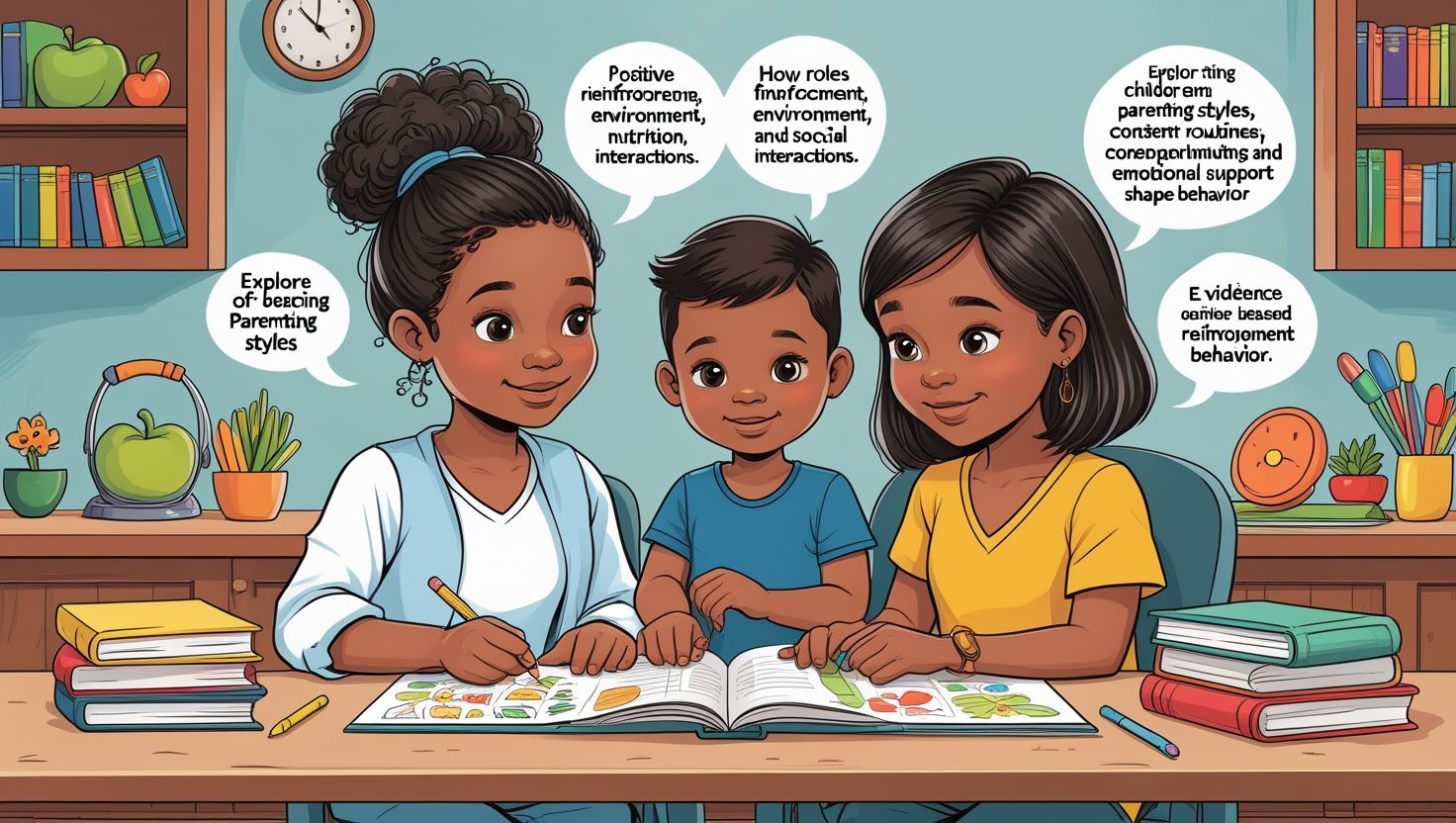Introduction:
Early Childhood Development and Behavior Change in Children is a critical period of growth and learning that sets the foundation for a child’s future. During this time, children undergo significant physical, cognitive, emotional, and social development, which can profoundly influence their behavior later in life. Understanding the relationship between ECD and behavior change is essential for parents, caregivers, educators, and policymakers to support healthy development and positive outcomes for children.
One of the key aspects of ECD is brain development. During the early years, the brain experiences rapid growth and wiring of neural connections, forming the basis for all future learning and behavior. Stimulating environments, nurturing relationships, and responsive caregiving play crucial roles in shaping the architecture of the brain. Positive interactions with caregivers provide children with emotional security and support cognitive and socio-emotional development.
ECD and Behaviour Change:
Behavioral patterns observed during early childhood can reflect the child’s environment, experiences, and interactions. Children learn through observation, imitation, and reinforcement, absorbing information from their surroundings and modeling behaviors they observe in adults and peers. Therefore, the quality of the child’s environment significantly influences their behavior and development.
Early childhood is also a period of considerable vulnerability to adverse experiences, such as neglect, abuse, poverty, and exposure to violence or toxins. These adverse experiences can disrupt healthy development and increase the risk of behavioral problems later in life. Adverse childhood experiences (ACEs) have been linked to a range of negative outcomes, including poor physical and mental health, substance abuse, delinquency, and academic difficulties.

Behavior change in children can occur through various mechanisms, including learning, socialization, and biological maturation. Learning involves acquiring new knowledge, skills, and behaviors through experiences, instruction, and observation. Socialization refers to the process by which children internalize societal norms, values. And expectations through interactions with family, peers, and other social agents. Biological maturation encompasses the natural progression of physical and neurological development, which can influence behavior.
Promoting positive behavior change in children requires a holistic approach that addresses their physical, cognitive, emotional, and social needs. Providing a nurturing and supportive environment is paramount, as it fosters feelings of safety, security, and trust essential for healthy development. Positive parenting practices, such as setting clear expectations, offering praise. And encouragement, and providing consistent discipline, can help shape desirable behaviors in children.
Early intervention is crucial for addressing behavioral concerns and promoting positive development in children. Identifying risk factors and addressing them promptly can mitigate the impact of adverse experiences and prevent long-term consequences. Interventions may include parent education programs, mental health services, early childhood education. And community-based support initiatives aimed at strengthening families and promoting resilience.
Educators play a vital role:
Educators play a vital role in supporting behavior change and promoting positive social and emotional development in children. Early childhood educators are trained to create nurturing and inclusive learning environments. That foster children’s social skills, emotional regulation, and problem-solving abilities. By implementing evidence-based practices and interventions, educators can help children develop pro-social behaviors, empathy, and conflict resolution skills essential for success in school and beyond.
Furthermore, collaboration between families, educators, healthcare professionals, and community organizations is essential for addressing the complex factors influencing children’s behavior and development. By working together, stakeholders can coordinate efforts, share resources. And implement comprehensive strategies to support children’s well-being and positive behavior change.
In conclusion:
Early childhood development and behavior change are intricately linked, with experiences during the formative years shaping children’s long-term outcomes. Providing a nurturing and stimulating environment, addressing risk factors promptly, and implementing. Evidence-based interventions are essential for promoting positive behavior change and fostering healthy development in children. By investing in ECD and supporting children’s socio-emotional needs, we can lay the foundation for a brighter future for generations to come.

I don’t think the title of your article matches the content lol. Just kidding, mainly because I had some doubts after reading the article.
Thank you for your sharing. I am worried that I lack creative ideas. It is your article that makes me full of hope. Thank you. But, I have a question, can you help me?
Your article helped me a lot, is there any more related content? Thanks!
Your article helped me a lot, is there any more related content? Thanks!
4fz35v
I like the valuable information you provide in your articles. I’ll bookmark your blog and check again here regularly. I am quite sure I will learn many new stuff right here! Good luck for the next!
jxo9j5
Rediscover your CD collection with this top-rated clock radio and CD player combo. Ideal for bedrooms, offices, or kitchens, it plays your favorite CDs while also offering a reliable alarm clock radio function. Dual alarms let you set separate wake-up times, and the clear digital display is easy to read day or night. With its stereo radio alarm clock capabilities and optional remote control, this CD alarm clock radio ensures comfort, convenience, and crisp audio in one stylish package. A top choice for those wanting the best CD alarm clock for sound and function.
Your article helped me a lot, is there any more related content? Thanks!
Thanks for sharing. I read many of your blog posts, cool, your blog is very good.
Thank you, I’ve just been searching for info about this subject for ages and yours is the best I have found out so far. However, what about the conclusion? Are you certain about the supply?
Thanks for sharing. I read many of your blog posts, cool, your blog is very good.
You clearly know your stuff. Great job on this article.
I appreciate the real-life examples you added. They made it relatable.
This post gave me a new perspective I hadn’t considered.
You’ve done a great job with this. I ended up learning something new without even realizing it—very smooth writing!
Hello there! This is kind of off topic but I need some help from an established blog. Is it very hard to set up your own blog? I’m not very techincal but I can figure things out pretty fast. I’m thinking about creating my own but I’m not sure where to begin. Do you have any points or suggestions? Many thanks
ox4zpo
dqbptf
3xocag
Very interesting information!Perfect just what I was looking for! “Better and ugly face than an ugly mind.” by James.
Your article helped me a lot, is there any more related content? Thanks!
Hi there I am so delighted I found your blog page, I really found you by mistake, while I was looking on Askjeeve for something else, Anyhow I am here now and would just like to say thanks a lot for a marvelous post and a all round interesting blog (I also love the theme/design), I don’t have time to read it all at the moment but I have bookmarked it and also included your RSS feeds, so when I have time I will be back to read much more, Please do keep up the superb work.
Thanks for sharing. I read many of your blog posts, cool, your blog is very good.
https://t.me/s/Official_1win_kanal/414
Официальный Telegram канал 1win Casinо. Казинo и ставки от 1вин. Фриспины, актуальное зеркало официального сайта 1 win. Регистрируйся в ван вин, соверши вход в один вин, получай бонус используя промокод и начните играть на реальные деньги.
https://t.me/s/Official_1win_kanal/4421
Some truly nice and useful info on this web site, likewise I believe the layout contains superb features.
Thank you for another excellent post. Where else could anybody get that kind of info in such an ideal way of writing? I’ve a presentation next week, and I’m on the look for such info.
Can you be more specific about the content of your article? After reading it, I still have some doubts. Hope you can help me.
I know this if off topic but I’m looking into starting my own blog and was curious what all is required to get setup?
I’m assuming having a blog like yours would
cost a pretty penny? I’m not very internet savvvy so I’m not 100% positive.
Anny tips or advice would be greatly appreciated. Many
thanks https://Hallofgodsinglassi.wordpress.com
Your article helped me a lot, is there any more related content? Thanks!
I’m truly enjoying the design and layout of your website. It’s a very easy on the eyes which makes it much more pleasant for me to come here and visit more often. Did you hire out a designer to create your theme? Superb work!
I needed to compose you the bit of remark just to say thanks the moment again for those breathtaking pointers you’ve shared on this website. It’s quite seriously generous with people like you in giving extensively what exactly a few people could possibly have supplied for an electronic book in order to make some cash for their own end, mostly now that you could possibly have done it if you considered necessary. Those advice as well worked as a easy way to fully grasp other individuals have a similar passion just like my very own to grasp good deal more in terms of this condition. I’m certain there are some more fun opportunities up front for individuals who see your blog.
Nice read, I just passed this onto a colleague who was doing some research on that. And he actually bought me lunch because I found it for him smile So let me rephrase that: Thanks for lunch! “Any man would be forsworn to gain a kingdom.” by Roger Zelazny.
I am no longer sure the place you’re getting your info, but great topic. I must spend a while learning more or understanding more. Thanks for wonderful information I used to be in search of this information for my mission.
I was suggested this web site via my cousin. I’m no longer positive whether this submit is written by way of him as no one else recognize such designated about my problem. You’re incredible! Thanks!
I like this blog very much, Its a very nice post to read and obtain information. “You have to lead people gently toward what they already know is right.” by Philip.
I’ve recently started a blog, the info you provide on this web site has helped me greatly. Thank you for all of your time & work.
Some genuinely prime articles on this website , saved to favorites.
I got what you intend, regards for posting.Woh I am glad to find this website through google. “I would rather be a coward than brave because people hurt you when you are brave.” by E. M. Forster.